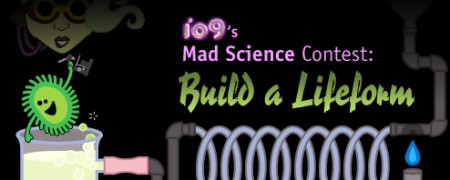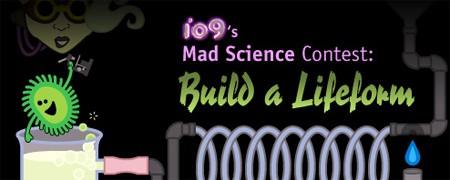
There’s still time to enter io9’s Build a Lifeform contest. Synthetic biologists, get cracking on the design of that synthetic lifeform or BioBricks lifeform! The rules are pretty straightforward; you need to propose a lifeform design that would be scientifically viable. The BioBricks lifeform part of the contest requires that your design needs to not only be scientifically viable, you have to explain how you would create it in a lab, and you get extra points if you already have an organism. The deadline is August 25, 2008. You could win the opportunity to attend an all-expenses-paid trip to the Synthetic Biology Conference in Hong Kong or $1000 and a chance to get your creature drawn by a cool comic book artist.
io95 Articles
Science Fiction, Help Or Hindrance?

We wonder what direct impact science fiction has had on research. Depictions of a 3D metaverse have always been compelling, but is pouring effort into half measures like Second Life a waste of time compared to serious computer interaction research?
We discussed this for a little while and concluded that whether inspiring or hindering, the very act of critically thinking about technology was beneficial. What books have inspired you in the past? Was it because they showed a better world or were they a stern warning?
Build A Lifeform For Io9

Whether you consider yourself a bona fide mad scientist or you simply think your horrifying mutant creations are misunderstood, you’ll want to enter io9’s Build a Lifeform contest.
The contest doesn’t require any actual primordial soup, just a concept of a synthetic lifeform you think would be useful or interesting. There are two categories with different prizes for each one. The first category asks contestants to use the BioBricks registry of standard biological parts to design a lifeform that could be created in a lab. Descriptions of how it would be made, what it would do, and potential hazards in creating it must all be included with the entry. The winner of this category will recieve an all-expenses-paid trip to the Synthetic Biology Conference in Hong Kong in October.
The second category is more focused on creativity, asking for the same descriptions as the first category without any BioBricks data. While this is the more speculative category, proposed lifeforms must still be plausible to create using current technology. The prize is $1000 and a signed drawing of your lifeform rendered by “a cool comic book artist.”
Both categories offer pretty good loot for your concepts, just be sure they’re more original than an esquilax if you intend to win.
For the background on BioBricks, check out [Drew Endy]’s Hacking DNA talk from last year. He’s one of the judges for the contest.
RoboGames 2008 This Weekend
The fifth annual RoboGames is happening this weekend in San Francisco. RoboGames is a broad reaching competition designed to bring together specialists in all areas of robotics. Last year’s event had 800 entries in 62 different events. The biggest audience draw is definitely the combat robots shown in the video above, but there are other skill and task based competitions. If you’re in the area, this is definitely worth your time. Check out ROBOT magazine’s coverage from last year to get an idea of what you’ll see (or in our case miss).
[thanks io9]
William Gibson Interviewed By Io9

Like many of you, growing up Neuromancer played a pivotal role in how we thought about the future and where “cyberspace” was going. Things have turned out very different. Although the underlying mass of data and consciousness is still there, it’s not the fully immersed 3D world some are still clinging to. [William Gibson], author of the seminal novel, has recognized this and readers will find his recent works like Spook Country, are set very firmly in the now, with technology like location sensitive augmented reality. io9 sat down with him during a San Francisco visit to talk about his fondness for Vancouver, the inability of authorities to maintain secrets, if his novels are really dystopian, and whether moving to Canada counts as draft dodging if you never get drafted.










